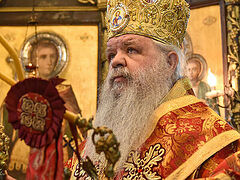Vevčani, North Macedonia, January 17, 2024
 Pascha at Bigorsky Monastery in North Macedonia. Photo: bigorski.org.mk
Pascha at Bigorsky Monastery in North Macedonia. Photo: bigorski.org.mk
Bigorsky Monastery of the Macedonian Orthodox Church-Ohrid Archbishopric issued a statement on Saturday condemning a blasphemous performance at this year’s edition of the Vevčani Carnival.
The annual event is timed to January 1/14—New Year’s Day according to the Julian calendar—which also coincides with the Church feasts of the Circumcision of Christ and the Holy Hierarch St. Basil the Great. The carnival traces back to pagan times, and today is a mix of paganism, “Christianity,” and political satire.
Balkan Insight writes that “more traditional participants wear masks depicting ghouls, goblins and devils, in accordance with the ancient belief that the noise and chaos they create will scare away evil spirits.”
Noting that the organizers of the event offered a public apology in previous years when the carnival offended Muslim religious sensibilities, so the monastery is now calling for the organizer’s to publicly apologize after images of men dressed as Christ carrying crosses made of beer crates were shown in the media.
Bigorsky, headed by its abbot His Grace Bishop Partenij, writes: “Deeply hurt by the obscenity and blasphemous mockery of the Divine Person of our Lord and God and Savior Jesus Christ, as well as the Holy Cross, the so-called Vevčani Carnival, we loudly call for a public apology from the organizers and from the participants in that unfortunate sacrilege, as well as for the prevention of similar events in the future.”
 Such disturbing imagery is common of the Vevčani Carnival. Photo: balkaninsight.com
Such disturbing imagery is common of the Vevčani Carnival. Photo: balkaninsight.com
“We wonder why, considering the negative experience of the past, now someone decided to abuse the Christian symbols, and that in a most humiliating and undignified way?”
The monastery also links to a statement it previously made in 2012, which opens: “Throughout its history, the Orthodox Church has fought resolutely and steadfastly against the soul-destroying remnants of pre-Christian pagan rites and manifestations.”
Bigorsky clearly states that such carnivals have nothing to do with Orthodoxy, although they are often portrayed that way in the media.
“It is not enough to say that such manifestations have absolutely nothing in common with Orthodoxy,” the monastery stated in 2012.
“At the carnival in Vevčani, paradoxically, the great Christian saint, St. Basil the Great, and even a flag with his image is flying! So, how can this holy father of the Church, whose God-speaking mouth preached the most against such dissolute and immoral celebrations, be put in the same basket with that against which he most zealously fought!?”
The monastery then traces the pagan origin of the festival and concludes: “From the very birth of such rituals, the holy Orthodox Church, through preaching and teaching, peacefully points out the harm to the soul of such non-Christian phenomena, primitivism and quasi-celebrations.”
Follow OrthoChristian on Twitter, Vkontakte, Telegram, WhatsApp, MeWe, and Gab!



